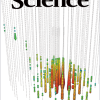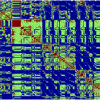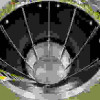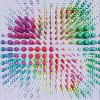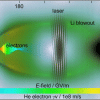Nuclear Science
Experimental and theoretical nuclear research carried out at NERSC is driven by the quest for improving our understanding of the building blocks of matter. This includes discovering the origins of nuclei and identifying the forces that transform matter. Specific topics include:
- Nuclear astrophysics and the synthesis of nuclei in stars and elsewhere in the cosmos;
- Nuclear forces and quantum chromodynamics (QCD), the quantum field theory of the strong interaction;
- Science and design of the accelerators, detectors, and other tools essential for pursuing nuclear physics research; and
- Low energy nuclear theory and the structure of the nucleus.
IceCube at NERSC
NERSC resources are helping to unlock secrets of our universe, ushering in an era of "neutrino astronomy" and revealing what powers the most energetic engines in the cosmos. Read More »
Building a Universal Nuclear Energy Density Functional
Massive computing resources at NERSC and elsewhere are being put to work to to arrive at a comprehensive and unified description of nuclei and their reactions. The foundation for this is a universal nuclear energy density functional.
Read More »
Daya Bay Reactor Neutrino Experiment
Daya Bay is an international neutrino-oscillation experiment designed to determine the last unknown neutrino mixing angle
theta_13 using anti-neutrinos produced by the Daya Bay and Ling Ao Nuclear Power Plant reactors.
Read More »
Lattice Quantum Chromodynamics
Why don't large atomic nuclei, with their composition of positively charged protons, just fly apart? Quantum Chromodynamics (QCD), and Lattice QCD, its numerical simulation, are helping to answer this question.
Read More »
Parallel Simulation of Electron Cooling Physics and Beam Transport
Nuclear Physics-supported research and development activities related to the science, engineering, and technology for accelerators of electrons, protons and heavy ions. Read More »






